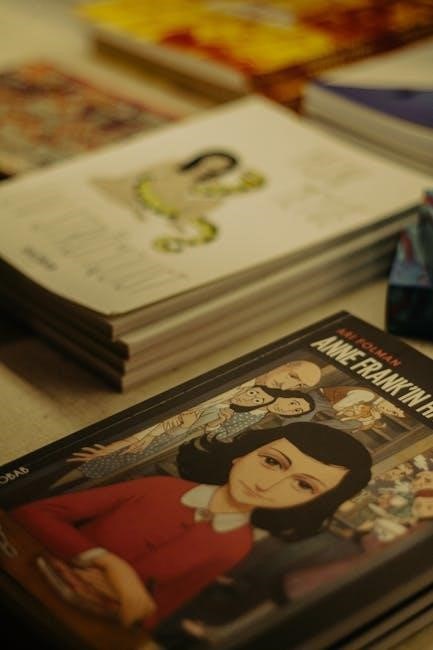Anne Frank, a Jewish girl born in 1929, documented her life in hiding during WWII in her diary, a poignant reflection of hope and resilience amidst oppression․
Who Was Anne Frank?
Anne Frank was a Jewish girl born on June 12, 1929, in Frankfurt, Germany․ She moved to Amsterdam with her family to escape Nazi persecution․ Anne received a diary for her 13th birthday, which she used to document her life in hiding during WWII․ Her diary captures her experiences, emotions, and hopes while living in the Secret Annex with her family and four others․ Tragically, Anne and her family were discovered and deported to concentration camps․ She died in 1945 at Bergen-Belsen․ Her diary, later published by her father Otto, became a global symbol of hope, resilience, and the horrors of the Holocaust․
Why Is Her Diary Significant?
Anne Frank’s diary is a profound and intimate account of life under Nazi occupation, offering a personal perspective on one of history’s darkest periods․ Her writings capture the emotional struggles, hopes, and resilience of a young girl in hiding, making it universally relatable․ The diary serves as a powerful educational tool, fostering empathy and understanding of the Holocaust’s human cost․ Its global popularity has made it a cornerstone of Holocaust literature, ensuring Anne’s voice continues to educate and inspire future generations about tolerance, freedom, and the human spirit․ The diary’s authenticity and emotional depth have cemented its place as a vital historical document․

Historical Context of the Diary
Anne Frank’s diary captures life under Nazi occupation during WWII, documenting her family’s hiding in Amsterdam to escape persecution․ The diary spans 1942–1944, offering a personal lens on history․
The Secret Annex and Life in Hiding
The Secret Annex, located behind Anne’s father’s office in Amsterdam, was the Frank family’s refuge from Nazi persecution․ This small, hidden space became their home from 1942 to 1944, shared with four others․ Life in hiding was cramped and tense, with constant fear of discovery․ Anne documented their struggles, hopes, and daily routines in her diary, providing a vivid glimpse into the emotional and physical challenges faced during this period․ Despite the hardships, the Annex became a symbol of resilience and the human spirit’s ability to endure under oppressive circumstances․
Impact of World War II on the Frank Family
World War II profoundly disrupted the Frank family’s life, forcing them into hiding to escape Nazi persecution․ The family’s displacement and confinement in the Secret Annex created immense emotional and psychological strain․ Anne’s diary vividly captures the struggles of living in constant fear of discovery and the tension within their confined space․ The war ultimately led to the family’s betrayal, arrest, and deportation to concentration camps․ Tragically, Anne and her sister Margot died in Bergen-Belsen, while only their father, Otto, survived․ The diary serves as a poignant testament to the devastating impact of the war on their lives and legacy․

Key Themes in the Book
Anne Frank’s diary explores themes of hope, resilience, and self-discovery, offering a profound reflection on humanity amidst the horrors of war and persecution․
Hope and Resilience in the Face of Adversity

Anne Frank’s diary vividly captures her unwavering hope and resilience despite the oppressive circumstances of WWII․ While in hiding, Anne maintained a steadfast belief in humanity’s goodness, often expressing her dreams for a better future․ Her writings reveal a deep emotional strength, as she clung to hope even when faced with immense uncertainty and fear․ This theme resonates deeply, showcasing the human spirit’s capacity to endure and remain optimistic in the darkest of times․ Her story continues to inspire readers, offering a powerful reminder of the importance of hope and resilience in overcoming adversity․

Coming of Age and Self-Discovery
Anne Frank’s diary is a profound journey of self-discovery, capturing her transformation from a young girl to a mature thinker․ During her time in hiding, Anne grappled with identity, emotions, and beliefs, revealing her growth through introspective writings․ Her diary reflects her struggle to understand herself and the world around her, showcasing her intellectual and emotional development․ The diary becomes a mirror of her soul, where she explores themes of adolescence, family dynamics, and personal aspirations․ This personal odyssey makes her story universally relatable, offering a deeply human perspective on the challenges of growing up amidst extraordinary circumstances․
Availability and Formats
Anne Frank’s diary is widely available in PDF, e-book, and graphic novel formats, ensuring accessibility across platforms․ Readers can explore her story in multiple languages and editions․
PDF and E-Book Versions

Anne Frank’s diary is widely available in PDF and e-book formats, making it accessible to readers worldwide․ Platforms like Litres offer the book in formats such as PDF, EPUB, and FB2․ The diary has also been translated into multiple languages, including Greek and Turkish, ensuring its global reach․ A graphic novel adaptation is also available, bringing Anne’s story to life visually․ Additionally, the definitive edition, edited by Otto Frank and Mirjam Pressler, provides a comprehensive view of Anne’s writings․ These digital versions ensure that Anne’s powerful story remains accessible to modern readers, preserving its historical significance for future generations․

Translations and Editions
Anne Frank’s diary has been translated into numerous languages, ensuring its universal reach․ The definitive edition, edited by Otto Frank and Mirjam Pressler, includes 30% more content, offering deeper insights․ Various editions cater to different readers, including graphic novels and illustrated versions․ Translations span from Greek to Turkish, making the diary accessible globally․ These editions maintain the original’s emotional depth while adapting to modern formats, ensuring Anne’s story remains relevant․ The availability of diverse translations and editions underscores the diary’s enduring impact, allowing readers worldwide to connect with Anne’s experiences during WWII․ This accessibility has made her story a timeless piece of historical literature․
Literary Significance and Impact
Anne Frank’s diary is one of the most significant books of the 20th century, offering a profound and emotional account of WWII’s impact on a young girl’s life․
Reception and Popularity
Anne Frank’s diary is one of the most widely read and significant books of the 20th century, resonating deeply with readers globally․ Its raw emotional power and honest narrative have made it a must-read, transcending generations․ The diary has been translated into numerous languages, ensuring its universal reach and appeal․ Its impact is further amplified by adaptations, such as graphic novels, which introduce Anne’s story to new audiences․ The book’s popularity endures, with millions of copies sold worldwide, solidifying its place as a vital piece of historical literature․ Its relevance continues to grow, making it a cornerstone of Holocaust education and awareness․
Cultural and Historical Importance
Anne Frank’s diary holds immense cultural and historical significance, offering a personal lens into the Holocaust’s atrocities․ It humanizes the victims, providing an intimate perspective on life under Nazi oppression․ The diary serves as a powerful educational tool, fostering empathy and understanding of one of history’s darkest periods․ Its global impact has led to numerous adaptations, ensuring Anne’s story remains relevant․ The diary’s message of hope and resilience continues to inspire, making it a cornerstone of Holocaust education and a vital reminder of the importance of tolerance and human rights․ Its influence extends beyond literature, shaping cultural discourse and historical memory․

Reading the Diary in the Modern Context

Anne Frank’s diary remains a vital educational tool, fostering empathy and tolerance․ Its themes of hope and resilience continue to resonate, making it a timeless resource for understanding history and humanity․

Modern Relevance and Lessons
Anne Frank’s diary offers timeless lessons on tolerance, resilience, and humanity․ Its themes resonate today, addressing issues like prejudice, censorship, and the importance of empathy․ The diary serves as a powerful educational tool, helping readers understand the Holocaust’s impact and promoting tolerance․ Modern adaptations, such as graphic novels and e-books, ensure her story reaches new generations․ The diary’s relevance extends to current social issues, making it a vital resource for fostering understanding and combating discrimination․ Its message of hope and resilience continues to inspire, reminding us of the importance of standing against injustice․
Engaging Young Readers
Anne Frank’s diary is a powerful tool for engaging young readers, offering insights into history, empathy, and resilience․ Adaptations like graphic novels and e-books make her story accessible to modern youth․ Interactive formats, such as PDFs with study guides, enhance learning․ Discussions on social media and in classrooms foster deeper understanding․ The diary’s relatable themes of hope and self-discovery resonate with teenagers․ Its availability in various formats ensures that Anne’s legacy continues to educate and inspire future generations, promoting tolerance and awareness of the Holocaust’s impact․ These efforts help young readers connect with her story on a personal level․
Anne Frank’s diary remains a timeless testament to humanity’s resilience and hope․ Its availability in PDF and e-book formats ensures accessibility for modern readers․ The diary’s themes of courage and self-discovery continue to resonate globally, making it a vital educational resource․ Efforts to preserve and adapt her story, such as graphic novels and translations, ensure its relevance for future generations․ Anne’s legacy endures as a powerful reminder of the Holocaust’s impact and the importance of promoting tolerance and understanding․ Her diary is not just a historical document but a heartfelt narrative that continues to inspire and educate readers worldwide․
